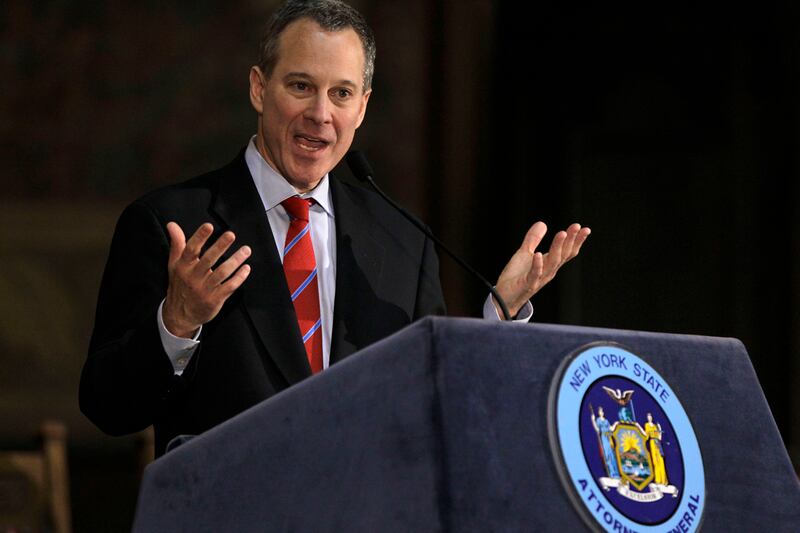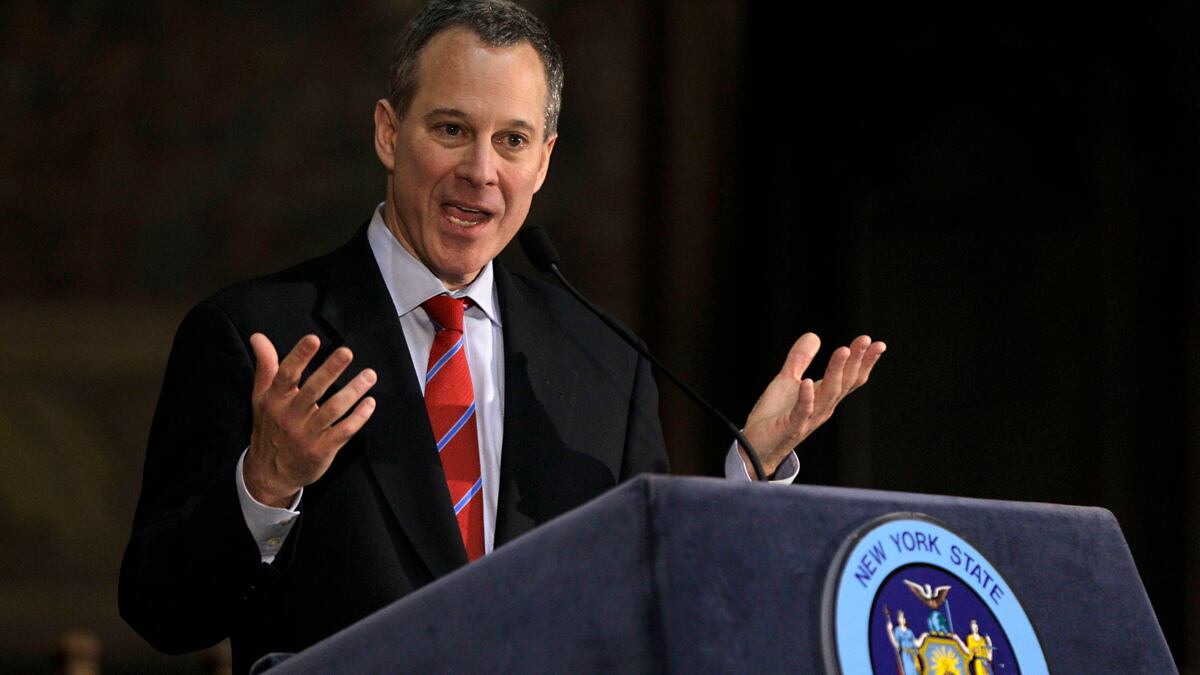I know I’m supposed to love Eric Schneiderman, the pugilistic attorney general of New York who has spent much of the past two months beating up on the banks. Everyone from the president (who chose a JPMorgan Chase executive to serve as his chief of staff, for heaven’s sake) on down has seemed willing to give them a pass. But there’s Schneiderman, demanding that the banks pay several pounds of flesh for the pain they’ve caused. Over the past few weeks, he’s been the subject of sweet-smelling profiles in The New York Times and Politico (“America’s Most Powerful Liberal?"); Rolling Stone’s Matt Taibbi and Nation editor Katrina vanden Heuvel are among the high-profile lefties blogging about his heroic powers.
Except I’m not ready to declare Schneiderman the next coming of Elizabeth Warren. Sure, I’m as eager as the next 99-percenter to see Wall Street’s worst offenders pay tens of billions of dollars in fines, if not stand trial for the damage they’ve done to the global economy. But I’m inclined to agree with those who’ve been waging trench warfare against the likes of Countrywide and Ameriquest stretching back a decade or more.
The more generous among these caped-crusader types view Schneiderman as well-meaning but misguided. The more cynical think he’s a grandstander: a politician overeager in his pursuit to be seen as Eliot Spitzer without the hookers.
A case in point is the negotiations between the country’s 50 attorneys general and the Obama administration on one side and the banks (Bank of America, JPMorgan Chase, Wells Fargo, etc.) on the other—the very talks that have thrust Schneiderman into the headlines.
Schneiderman’s beef is that his colleagues are too narrowly focused. The attorneys general, working with the U.S. Justice Department and HUD, have chosen to look only at the laws the big banks have broken in their rush to get delinquent mortgage holders out of their homes. How about the crimes lenders committed getting people into those homes—and the further crimes committed when Wall Street, after snapping up as many subprime loans as it could get its hands on, bundled them and sold them in small slices to unsuspecting investors? “The goal,” Schneiderman told me when we sat down in his office in a high-rise around the corner from Wall Street, “should be getting the best deal we can. For the borrowers who were done wrong and for the investors who were done wrong.”

That would take more time, of course. It would mean bringing in new sets of players and, most important, putting on indefinite hold a settlement plan that would both help fix a broken foreclosure system and force lenders to sit with individual homeowners to work out a loan modification. That’s a plan that old warriors in the fight like Ira Rheingold, executive director of the National Association of Consumer Advocates, wish Schneiderman would get behind.
“He’s probably right that his approach would get more money, but that’s not the most important thing for people like me,” says Rheingold, who has been battling predatory subprime lenders dating back to his days as a Legal Aid attorney in the 1980s. “It’s fixing the damn system. It’s making sure people who can save their homes have the right to save their homes.” Then, with the sigh of someone who's been engaged in the same fight for a very long time, he adds, “I think sometimes we lose sight of what’s possible to achieve.”
* * * * *
The bad guy in Schneiderman’s telling is Tom Miller, the Iowa attorney general, who is no bad guy at all. (“One of the better AGs we’ve had in a long time,” Rheingold says.) It was Miller who, around this time last year, started calling his fellow attorneys general to see about jointly investigating the “robo-signing” scandal then in the headlines. It wasn’t bad enough that lenders recklessly wrote home loans with little regard for a borrower’s ability to pay—or that individual employees, if not sometimes entire offices, routinely forged loan documents and larded deals with hidden fees. Now these same banks, to speed up the foreclosure process (and to cover up the sloppiness of their record keeping), were caught fudging legal papers. The worst of it: individual employees were signing—robo-singing—hundreds of affidavits in a day, swearing they had done the necessary due diligence to prove the bank had the right to seize an individual’s home. Red state, blue state, it made no difference: within a few weeks, Miller, an affable Democrat who has served as the Iowa attorney general since the middle of the Clinton presidency, was sending out a press release announcing that all 50 AGs were banding together to investigate the banks and the servicing companies they hired to collect people’s monthly mortgage checks.
“All of us saw an opportunity to change the dysfunctional way homeowners have been treated in the foreclosure process,” Miller told me by phone last week.
By all rights, bank regulators in Washington, not the AGs, should have been the ones clamping down on these abuses. But overseers like the Office of the Comptroller of the Currency have consistently gone easy on the national banks they are charged with monitoring. Justice and other federal agencies might have bullied the banks into doing the right thing long before the term "robo-signing" became part of the national vocabulary, but that’s not the president we elected. The Obama administration also might have added teeth to HAMP (Home Affordable Modification Program) rather than relying solely on incentives, which explains why HAMP has helped only a small fraction of the 3 million to 4 million homeowners it was created to help.
“The attorneys general shouldn’t be here, but Obama fell down on the job,” says Prentiss Cox, who ran the Minnesota attorney general’s consumer-enforcement division before taking a teaching position at the University of Minnesota Law School. “The Obama administration abdicated responsibility. So while many of us are colossally disappointed with where we are, you can’t blame the AGs. The AGs were at least willing to step to the plate.”
Initially, it was the Republican AGs giving Miller a hard time. From the start, Miller had stressed that he was less interested in a big-dollar settlement than in a deal that remakes a broken foreclosure system. The red-state AGs were on board with that. The rub was that Miller also intended to use their threat of a 50-state prosecution to force the banks to do something their executives had been resisting: widespread loan modifications. To a housing advocate, a loan mod is only natural. Why rush to foreclose on a homeowner owing $250,000 on a property valued, post-bubble, at $200,000? Why not at least try to negotiate a new deal, given that the bank is taking a big loss on that property anyway? But to conservatives, this meant big government meddling in private enterprise. So Miller first had to convince his Republican counterparts that it was in everyone’s best economic interest to help keep people in their homes, and thereby minimize a glut of homes on the market at once, before trying to convince the banks on this same point.
“What’s really going on here is, can we do an agreement that’s bipartisan and in the public interest, or will the left or the right be able to shoot us down?” Miller says.
Miller briefed Schneiderman on the case in February, shortly after Schneiderman took office. Schneiderman was a newcomer to the 50-member fraternity, but he was also a former corporate attorney who had represented the likes of Merrill Lynch and the American Stock Exchange. More important, he represented New York, where crusading AGs have used its more consumer-friendly laws—for instance, while a federal prosecutor must prove intent in a fraud, New York requires only that you prove a fraud was committed—to crack down on abuses committed by banks operating inside its borders. The New York AG’s signature on a deal would be critical, so Schneiderman was given a spot on the executive committee overseeing the case.
From the start, Schneiderman said, he was dubious about the approach taken by his fellow AGs. Where was the investigation, he wanted to know. “If you don’t do an investigation, what leverage do you have to force the other side to give you a good deal?” he asks. Miller, for his part, had been meeting with the banks since November. “We knew how extensive a problem robo-signing was, and the banks knew we knew how bad it was,” Miller says. “It’s doubtful it would have increased our leverage in any significant way if we took another year to do more investigating.”
Despite their differences, Miller asked Schneiderman to join the small negotiating team he was putting together. This was June, and they were starting to hammer out details with the five banks—Bank of America, JPMorgan Chase, Citigroup, Wells Fargo, and Ally (formerly GMAC)—participating in the talks. Schneiderman, however, declined the invitation. “He told me he wanted to go down a different path,” Miller says.
From there, things went from bad to worse. “He was attacking what we’re doing publicly,” Miller says. “He was doing everything he could to frustrate our settlement talks, including leaks of materials we gave him through the executive committee.” Fed up, Miller booted Schneiderman from the executive committee, a decision that Schneiderman claims he learned about when a reporter phoned his press secretary for comment. It was then that Schneiderman’s fundraising committee sent out an email to supporters under the subject line “Standing Up for You.”
* * * * *
In person, Schneiderman, 55, has none of the thrust-jaw aggressiveness of Eliot Spitzer. He’s slight and wiry, a low-key former state senator who comes across more as earnest public servant than self-righteous crusader. When talking about his motivations in taking banks to task, he starts with a civics lesson. He is making a perfect pest of himself, he says, because if people don’t believe that the same rules apply to rich and poor alike, “that loss of confidence is a devastating thing for a functioning democracy.”
“People need to know there’s accountability—that if you break the law, there are consequences no matter how big or how deep your pockets,” Schneiderman says.
He's picked up several allies along the way, including Beau Biden, the Delaware attorney general and son of Joe Biden. “My job is to take the facts where they lead us, and the reality is there’s a lot more to investigate,” Biden told me. On Sept. 30, Kamala Harris, the California attorney general, might have killed any hopes of a deal when she announced that her state, home to more foreclosure cases than any other, was withdrawing from the negotiations because the proposal being sought “is not the deal California homeowners have been waiting for.” The deal on the table would have required the banks to provide $17 billion in mortgage write-downs, a sum Harris declared “nowhere near adequate.”
Prentiss Cox of Minnesota, of course, agrees that $17 billion is grossly lacking. Cox had gotten a first-row seat on the nastier side of subprime when he led the successful case against Ameriquest, an investigation that cost the lender $325 million in fines in 2006. Yet he thinks that this idea of broadening the AG’s case borders on the insane.
“I don’t think you’d create more leverage by bringing in a truckload of new parties and issues,” Cox says. “From the outside, I think you’d just be creating a huge, huge mess.” Adds another veteran of these earlier efforts to fight the subprime lenders, “It feels real good to beat up on these people, given all the harm they’ve done. But you’ve to ask, what’s the strategy here?”
To Ira Rheingold, who heads the trade association for consumer advocates, the real shame is the false choice that’s been created. Miller has assured his colleagues that any agreement will be written in such a way that it won’t tie the hands of any AG seeking to investigate subprime frauds beyond the foreclosure mess. Schneiderman can prosecute Wall Street malfeasance to his heart’s content. (He’s already dropped subpoenas on Goldman Sachs, Morgan Stanley, and Bank of America, among others.) So, too, can Beau Biden and Kamala Harris and any other attorney general with both the budget and the inclination.
“I don’t understand why this had to become such a pissing match,” Rheingold says. “I don’t know the political game here, but I know the homeowners are suffering.” There were 2.9 million foreclosures last year, and the country is on pace for nearly that many this year. “How many people have to lose their homes while we figure this out?” Rheingold asks.





